
This review may contain spoilers
Records Or Memories?
I know I sound like a broken record, but the Koreans are the masters of entertainment! And only the Koreans are masters of combining comedy with drama with a thoughtful message, which in my opinion, represents the next step of evolution in the entertainment industry. We all want to be entertained, but to use the medium of movies and TV shows to convey a message is to really use this medium to inspire and provide awareness.This movie is a true delight, and you are likely to find yourselves with some absolute laugh-out-loud moments as well as moments that just might tug at your heartstrings.
Yoon Hong Dae is a professional soccer player who ends up in trouble and is placed on probation. His agent—in order to try and restore Dae’s questionable reputation—puts him in charge of organizing and coaching a team—a team of homeless men to compete in the World Cup for Homeless players in Budapest.
Of course, we get a collection of homeless men of varying ages and backgrounds with different sets of skills. Seeing these guys attempting to play soccer is absolutely hilarious! One cheers when he kicks the ball and his shoe flies over the goal! And yet, each player has something to play for. They aren’t proud of being homeless, but this game just might restore the confidence to make some life changes as well as help people become aware that homelessness is a problem that has to be addressed. There are enough resources on this planet to ensure that every single human being has food, water, clothes, and shelter. So, why is it so hard?
Lee So Min is in charge of the documentary she is making to help showcase the team. Of course, she and Hong Dae don’t exactly see eye-to-eye, and their spats and bickering will make you giggle.
At first, Hong Dae is less than thrilled to be coaching a team of homeless men, most of whom have little-to-no skills. He figures he’s wasting his time, but the more he gets to know them, the more he finds a connection between each of them. Perhaps that is a part of the process: not to see a homeless person as a homeless person but as a person. It’s difficult to ignore someone when you’ve developed a connection. It’s even more inspiring when the entire team comes together to try and get Hong Dae out of trouble when he’s wrongfully charged with assault against four teen boys who harassed a woman with a mental disability.
The movie isn’t about winning. It’s about awareness as well as simply doing your best no matter how badly the odds are stacked against you. This is an especially powerful point when dealing with homeless people who may easily feel, “What’s the point? Nothing changes.” But Hong Dae asks them a poignant question, “Are you here for records or for memories?”
One thing I will say is that this movie is certainly memorable, important, and a sheer delight to watch. It reminded me of a combination of the “The Mighty Ducks” and “The Bad News Bears.” “Dream” certainly more than belongs in that kind of company!
Was this review helpful to you?
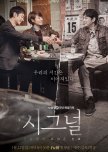
This review may contain spoilers
One of the Most Innovative Thrillers I've Ever Seen!
“Signal” is one of the most innovative and original thrillers I’ve ever had the privilege to watch. It captivates you right from the beginning and never lets up. The writing is crisp and taut, leaving the viewer to sit in wonder as to where the next leg of the story is going to go, while at the same time, wondering what the fate of our three protagonists is.Park Hae Young is a brilliant criminal profiler with a tragic past, one in which he seems to be the center. While he’s a lieutenant with the police department, he does not like the police, nor does he have any faith in their ability to do their job—and with good reason as we find out as the story unfolds.
Detective Cha Soo Hyun is one of the few female violent crimes detectives who seems cold and a bit aloof, but she’s dedicated to her job, and she also comes with a tragic past: the only person to treat her with respect as well as the love of her life in Detective Lee Jae Han who mysteriously disappeared 15 years ago from when this story is set.
Finally, we have Detective Lee Jae Han who leads a one-man crusade to fight against police and political corruption within the police department. He has absolutely no compunction about acting alone, as he’s determined to always do the right thing and bring justice for those who are incapable of getting it otherwise. In many ways, Lee Jae Han is the glue of the trio, and demonstrates that you can never give up no matter what happens. He is the one person Park Hae Young respects within the police department, and soon Cha Soo Hyun as well.
The main focus of this series is a radio that sends its transmissions into the future, and always at the same time, although not every day. Park Hae Young is soon amazed that he’s speaking to Detective Lee Jae Han in the past, using a radio without batteries! How can this be? The series does not ask nor require an explanation, but simply for the viewer to go with it. Perhaps it is the spirit of Lee Jae Han and his fierce determination that causes this phenomenon to occur. In the end, it doesn’t really matter.
Soon placed on a Cold Case Squad under Cha Soo Hyun, Park Hae Young and Detective Lee Jae Han begin to tackle cold cases of the past, and together, hope to solve them and catch criminals who are uncaught—that is until the mysterious radio transmission begins to occur. Park Hae Young has access to evidence that Detective Lee Jae Han doesn’t in the past, including the future location of crimes at future points in time.
However, we soon learn that not everything is resolved because of this advantage, and Park Hae Young quickly discovers that certain things that have been corrected are not always for the best, as others are forced to pay a price for the interference.
There are plenty of plot twists as the story continues with the three of them trying to uncover the central plot to the story that has caused the death of Detective Lee in the past as well as the death of Park Hae Young’s brother. This, of course, raises certain questions, whether they be moral or ethical: can Detective Lee be saved from his fate? Should he be? And can anything be done to save Park Hae Young’s brother?
The series raises a glaring philosophical question: if you could go back and change something from the past, would you? Most people, without really thinking things through, might quickly say, “Yes!” But then, how would things change? This is something that our three characters must ask and answer within the scope of the story. Kobe Bryant was once asked if he had a time machine, would he not want to go back and change things? He very quickly said, “No. I’d never use it. Because that undermines everything that I ever learn from my mistakes.”
Most people have events of the past that they wish they could have done differently. These may even include tragic moments where accidents or events have led to the death of a loved one. Therefore, it may be far more challenging to refrain from using a time machine ability to change the past with the hope of changing the future.
Time stories are very, very difficult to do well. They tend to fall under one of two results: those done very well, and those that are done very badly. There really isn’t an in-between. This is not only one of the few that does it well, but it’s among the very best that I’ve seen. Perhaps only time stories in the Star Trek universe have been done better.
While all three actors are absolutely fantastic in this series, it’s Jo Jin Woong who is the standout for me. He carries himself beautifully as a dedicated detective who is very uncomfortable with personal advances, such as those we see from Cha Soo Hyun toward him, leading to some absolutely hilarious exchanges between the two of them. He plays a hard-nosed detective who refuses to take guff from anyone, no matter their rank. He’s definitely a very idealistic police officer who still believes in the system and that his job is to bring justice. In many ways, Detective Lee is a true hero.
This is a series that will hold your interest all the way to the end. I had only a slight reservation at the very end, and I thought it was because they might have been leaving the door open for another season, but that wasn’t the case. How did Detective Lee survive/escape his last attack? And are Park Hae Young and Cha Soo Hyun successful in, not only getting to him in time but also able to bring down the corrupt congressman? The answers to the last two questions, we can assume that they do, but the first question is left much more obscure that, frankly, needed an answer. But, neither of these prevented me from being grateful for being able to watch such a fantastic series!
Was this review helpful to you?

This review may contain spoilers
Truth and Consequences of Korea's Education System
“Crash Course in Romance” is a series that is rock solid through fifteen episodes, and then limps to the finish line with a very mediocre final episode. It was clear that the writers had enough material for fifteen episodes, and then ended up having to come up with some gimmicks to stretch it to sixteen, which is almost always a mistake for a writer to make.This is a series that is part romance, part thriller, which is something that the Koreans are masters. They are fantastic at utilizing multiple genres within a single series and making it work.
This is a series that seeks to shed light on the obsession with education in Korea. Korea is one of the top countries in education, which obviously accounts for much of the country’s success. But, at what cost? Korea also has one of the highest suicide rates in the world, especially among teens. You’re dealing with tiger moms, worn-out kids, and one of the most competitive cultures in the world.
I am an ESL teacher, and I have lived and worked in Korea, China, and Taiwan in the Asian countries. While education is huge in all three, Korea surpasses the others when it comes to an almost obsessive, compulsive need to be the best. And this series does a tremendous job of exposing the education culture of Korea with the realization that change is needed.
First of all, students in Korea are expected to study from sunrise, and in many cases, until midnight or later. This is true for children as young as 2nd or 3rd grade. I remember asking many of my students on the eve of a long holiday what they planned to do (thinking that they might do something fun). All of them said, “Studying. My parents told me to bring my books on our vacation.” In the series, we see the culture of students in Nam Hae Yi, Bang Soo Ah, and Lee Seon Jae.
Bang Soo Ah has an unhealthy and frenetic outlook on her education. If she doesn’t finish as #1, she sees herself as a failure. But worse than that, she gets angry at those who beat her, feeling that they must have done something wrong or dishonest.
Lee Seon Jae is put under such pressure from his mother, that he ends up doing something terribly wrong.
Second, we have Tiger moms. This a term used to describe mothers who are so obsessed with their children’s education and future, that nothing else matters to them. They will even dictate to teachers what should or shouldn’t be done. We have a number of tiger moms depicted in this series. Of course, they will all state that it’s for their children. This is a lie. These are women who live vicariously through their own kids and use them to achieve social status. Their children are nothing but pawns, and yes, this is a form of child abuse. It’s no less abusive for moms in the west who give little-to-no attention to their kids, not caring what they do or don’t do. That is abuse too. These are two cultures of extremes, where balance is needed. Make no mistake: most children in Asian countries and cultures are never given much of a chance to be a kid. Many of their lives are mapped and planned out for them. They are told who to marry, what job they will do, and what to do every single day. I have spoken with so many native teachers of these countries who say that they hate their education system.
Believe it or not, I actually had a Korean student who was upset with his test scores at school. His own mother told him, “If you can’t do any better than this, then you should throw yourself off the balcony!” Yes, that’s a true story.
In this series, we have tiger moms who will do anything to bring other students down. Other mothers down. In short, there isn’t much they won’t do to ensure that their child is among the elite. Now, you may look at some of the scenes in this series and say, “Goodness! Do those things really happen? Do mothers really do these kinds of things?” Yes, they do. And that is the truth of the harsh reality that virtually nothing depicted in this series is exaggerated.
Choi Chi Yeol is arguably Korea’s top academy math teacher. He’s so popular, that moms and students line up on the street for a chance to get into one of his classes. There’s no doubt that he’s a great teacher, bringing great enthusiasm and passion to his classrooms. However, it’s also apparent that teaching is all there is for him. He can barely eat, and he even sleeps less. And his small, bubble world is finally blown up when he meets Nam Haeng Seon. What’s funny is that Choi Chi Yeol is horrible at remembering people’s names, including those he works with. However, someone is killing anyone who attempts to harm Choi Chi Yeol, and we’re given a pretty good thriller aspect as we try to figure out who it could be.
Nam Haeng Seon is a woman who runs a small side-dish café while raising her niece who was left on Nam Haeng Seon’s doorstep when the girl was only a few years old. It’s clear that Nam Haeng Seon wants the best for her niece, but she wisely allows Nam Hae Yi to choose and create her own path. In short, she’s a supportive mother who isn’t a tiger mom. She’s a perfect balance of supporting Nam Hae Yi without going overboard.
The relationship between Choi Chi Yeol and Nam Haeng Seon is endearing and cute, despite the fact that occasionally, there appears to be little romantic chemistry between the two leads. Don’t get me wrong. Jeon Do Yeon and Jung Kyung Ho are masterful in their roles. But I made me wonder if the fact that Jeon Do Yeon is 10+ years older than her co-star had something to do with it. I’ve seen Jung Kyung Ho in series like “Hospital Playlist” and he’s nothing short of brilliant in this series as well. He’s very believable as the tightly wound and somewhat aloof math teacher. I was also very impressed with Roh Yoon Seo (Nam Hae Yi). This young lady has a bright future ahead of her.
This series was a “10” for me until the last episode. The writers suddenly forced a contrived storyline upon us where Nam Hae Yi’s mother comes back, and she suddenly announces that she’s going to move with her selfish, gold-digging mother to Japan, which comes right out of the blue. Also, it simply doesn’t fit with the character of Nam Hae Yi. Now, one might believe that she did it to protect her aunt and Choi Chi Yeol, but no resolution or discussion is ever made to account for her behavior. It was ridiculous and it didn’t fit with the rest of the story. We also got no real resolution between Lee Seon Jae’s mother and his brother, whom she suspected of being a murderer. A resolution scene there would have gone far, but that came up short as well.
All in all, this was a very nice series to be a part of. I’m glad that someone decided to shed some light on Korea’s issues with the educational system. It’s high time the children stop paying the price for their parents’ obsession with status. This series would have been perfect had it ended after 15 episodes, but even with the lackluster 16th, it’s still a good series!
Was this review helpful to you?

This review may contain spoilers
Sixteen Episodes With These Delightful Women Just Doesn't Seem Like Enough!
You know you’ve come across a hit ensemble cast of characters when you’re equally vested in all three of them. In other words, you never find yourself sighing and wishing that the story would go back to the one character you like the most. This is far rarer than people realize. As far as ensemble casts go, the only other K-drama I can find myself saying this about would be “Hospital Playlist.”Three women from different backgrounds live together. They all work in the entertainment industry. Eun Jung Lee runs a production company, and she finds herself working on a documentary about actress, So Min Lee. Jin Joo Im is a screenwriter who is initially working for a more famous and seasoned screenwriter, until she realizes that their ideas are very different, and she has the courage to branch out on her own. And finally, we have Han Joo Hwang, who works for a small production company, at first as a marketing director, but soon as a producer herself. All three women are thirty.
Eun Jung Lee is the glue of the trio. She’s sharp, independent, and finds herself struggling to deal with a personal tragedy. The love of her life recently died of a terminal illness. She sees him everywhere and even engages in conversations with him. If you have ever had to deal with the loss of a loved one, you can easily sympathize with Eun Jung. And while she’s a strong woman, especially when dealing with anyone who tries to bring her or anyone else down, the cracks in her armor are growing by the day until she finally decides to seek some professional help. Eun Jung is the mother hen, and we can determine that she’s always been this way. Her brother, who lives with the them, is a gay man, and it becomes painfully obvious that their parents never accepted him. In short, Eun Jung has always felt compelled to be the pillar of strength for those closest to her. But here is the age-old truth: you can’t take care of anyone else until you first learn to take care of yourself. You have to be the priority.
Jin Joo is a woman who has the courage to face the unknown; to strike out and become and independent screenwriter. Of course, it helps to have the encouragement of friends, but when she meets film director Beom Soo Son, he helps her become more confident in herself. She is the most cautious member of the group, who isn’t as prone to simply “jump in” to a new romance or situation. Having got out of a long-term relationship, we can see why she’d be hesitant to start another one. But then again, life is about risk. Love is about risk, and you can never get anywhere in life by sitting on the sidelines where it’s safe and secure.
Finally, we have Han Joo Hwang, who arguably has more life experience than the previous two. She found herself in love at a young age, had a son, and suddenly found herself all alone when her husband divorced and left her high and dry. Now, as a seasoned marketing director, she takes on a young intern in Jae Hoon, and does her best to pass along what life wisdom she has to help him navigate his own romantic problems. While it becomes obvious that Jae Hoon is infatuated with Han Joo—and we can also see that Han Joo is a bit smitten with him as well—she already knows that getting involved with Jae Hoon is a bad idea. First of all, she’s his boss at work. And second of all, Jae Hoon has a lot to learn about himself and how to be in a relationship. There is a very touching scene in the last episode in which Han Joo maps out perfectly Jae Hoon’s most recent relationship that ended badly and why it failed. Han Joo already knows, that even if they were to enter into a relationship, Jae Hoon would end up treating her the same as he had his previous girlfriend, and Jae Hoon realizes this.
This series is about three women who navigate life’s ups and downs. In some ways, life is like a big K-drama, starring you and those around you, and those with whom you have friendships and relationships. It’s about dealing with one crisis and preparing yourself as best you can for the next one. In a show, you as the writer and director control and dictate what happens to your characters as well as the situations they are in. In life, you can only control yourself. However, in both, you still have to deal with moments of happiness and moments of disappointment and learn how to move on. It’s human behavior. It’s life! And this show does a fantastic job of mirroring life within the confines and world of this sweet and often touching, drama.
And, yes, that also means enjoying yourself and not following some arbitrary rules. As soon as you try to grasp love and life by putting rules and boundaries upon them, you’ve already failed to realize that life and love are like the wind. They are there to be enjoyed, not to be harnessed and held onto. Jin Joo and Beom Soo make this mistake when they try to separate work and love by some silly rules.
Performances in this series are rock solid across the board. As with so many K-dramas, we have hilarious moments, cute moments, and heartfelt moments. We find ourselves cheering for most of the characters, and by the end of the series, we can say that they have come out the other side of things pretty well. But life isn’t about stopping or sitting on our laurels, thinking we’ve finally crossed a finish line. There is no finish line. There is always the next thing. Bruce Lee once stated that a plateau in life makes a nice, brief rest stop, but don’t ever stay there. You have to keep going. And by the end of the series, you are confident that our three protagonists have already come to that realization.
Was this review helpful to you?
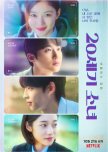
This review may contain spoilers
Cherish Those Wonderful Moments!
I will be honest. This coming-of-age romantic comedy/drama surprised me. I thought it was going to be another one of those typical young romance stories, but the writer threw a few curveballs that I didn’t see coming.Na Bo Ra is a young high school girl whose best friend, Kim Yeon Do, is headed to the US for heart surgery. Given how advanced Korean medicine is, I was a little surprised that she had to go so far, but I quickly let it go. Kim Yeon Do also briefly meets Baek Hyun Jin who helps her, and she, of course, immediately falls head over heels for him. Since she is going to be away for a while, Yeon Do asks Bo Ra to find out everything she can about her new, prospective love.
We’ve seen this situation dozens of times in stories like this one as Bo Ra follows Baek Hyun Jin around the school—sometimes with hilarious moments—in order to gather information for her friend. It is 1999 and emailing is slowly becoming the way of communication, and Bo Ra sends her friend emails with updates and information about Baek Hyun Jin. Bo Ra also finds herself speaking with Hyun Jin’s best friend, Poong Woon Ho, who is a confident, but somewhat withdrawn boy who enjoys photography.
I figured was going to begin as another typical storyline, gave me my first curveball. The writer brilliantly decided to use the “mistaken identity” ploy, and it works really well here! Bo Ra finds herself infatuated with Woon Ho, which she figures is all well and good. After all, her friend is in love with Hyun Jin, who doesn’t interest Bo Ra at all. But Hyun Jin becomes interested in her. But that isn’t where the twist begins. When Yeon Do returns, we find out that she’s in love with Woon Ho because he was wearing Hyun Jin’s jacket at the time they met, which had Hyun Jin’s name tag on it. Hence, we now have two girls in love with the same guy. Of course, this crushes Bo Ra, who is now trying her best to prove to her friend that she is NOT in love with Woon Ho, and thus, she steps aside.
The moments between Bo Ra and Woon Ho are sweet and endearing, as it’s clear that these two have real chemistry. Bo Ra isn’t necessarily a wallflower and even takes the initiative to ask Woon Ho out on a date. This occurs right before Yeon Do reveals the truth about the object of her affections. We have tender moments of Bo Ra and Woon Ho eating ice cream, Woon Ho helping a drunk Bo Ra on a field trip, and an especially precious moment under a plum tree.
I was a bit put off by Yeon Do’s reaction when she finds out the truth of Bo Ra’s feelings for Woon Ho. After all, it wasn’t entirely Bo Ra’s fault regarding the mistaken identity. But Yeon Do quickly redeems herself when she realizes that Woon Ho is also in love with Bo Ra, and she encourages her friend to not let anyone stand in her way.
Woon Ho’s mother and brother live in New Zealand, and his father sends him back to the country. We aren’t given an explanation as to why, but it’s here that we get a tearful goodbye between Woon Ho and Bo Ra at the train platform as he sets off. I love how Koreans emote. It always feels so genuine and heartfelt, and we feel the pain of separation as Woon Ho sobs as the train pulls away, and Bo Ra is also left sobbing on the platform.
In the final act of the film, we get another major twist. Woon Ho and Bo Ra are able to maintain contact (only via email) until some time after the new year. Bo Ra is entering college, and we can only assume that Woon Ho is doing the same. Woon Ho vows to return to Korea to be with Bo Ra, but suddenly, all communication stops. Bo Ra’s emails go unanswered, and even when she attempts to call his pager, there is no response. Believing that Woon Ho has lost interest, she angrily and tearfully leaves a message and vents her frustrations, vowing to never want to see or speak with him again.
Now, I’ve seen enough movies and shows over 45+ years to recognize when something is up, and I had a strong suspicion that something happened to Woon Ho. Given his love and devotion for Bo Ra, there was no way he would lose interest. Of course, as a somewhat insecure young woman just out of high school, Bo Ra’s reaction wasn’t a surprise either. The last thing she would suspect is that something tragic has taken place.
Sure enough, as we jump some fifteen or twenty years later, Woon Ho’s brother contacts Bo Ra and invites her to a photography exhibit. Bo Ra is shocked to see that nearly every photograph on display has something to do with her. And it is here that Woon Ho’s brother tells her that Woon Ho died back in 2001.
I found two things frustrating about the ending, despite not really having a major issue with it. First, I don’t care who you are, when you find out that someone has died—especially someone close to you—you want to know how it happened. And Bo Ra never asks the obvious question, and Woon Ho’s brother never tells her. I’ve had close friends pass away in the last few years, and my first thought is, “What happened? How did they die?” And when someone dies young, it’s frankly, a very obvious question.
And second, I wish they’d extended the ending a bit more. More talk and conversation between Bo Ra and Woon Ho’s brother would have been nice. I’m sure Bo Ra would have had a million questions about him. But the exchange is much too brief given the situation. I’d be curious what ended up on the cutting floor during this sequence.
I saw Kim Yoo Jung in “Backstreet Rookie” which was a disappointment. My only minor criticism is when she cries. Her wailing and sobbing almost felt forced at times. Older Bo Ra—played by Han Hyo Joo—felt much more tender and real. Perhaps because Hyo Joo is older and a much more seasoned actress. As she sits and watches the videos that Woon Ho made from years ago, it was much easier to empathize with her.
The movie reminded me a little bit of the classic film “The Man In the Moon,” a story of two sisters who fall in love with the same boy, which ends tragically. Part of me wished this film had more depth like that movie, especially in the end. However, the fantastic acting of Han Hyo Joo and Byun Woo Suk (Woon Ho) really made the ending powerful and heartfelt.
This was a film that was much better than I thought it would be. There is something that has always captivated me regarding good coming-of-age stories and romances. Perhaps because many of these stories involve first-time experiences that come from a place of innocence and childlike wonder. And they are always heartbreaking when tragedy occurs. But then, that’s life, isn’t it? Not every romance will have a “happily ever after” ending.
Perhaps the message here is to cherish the time you have with loved ones. Don’t take them for granted because you never know when time is suddenly up. Relationships are about moments, however brief or long they may be.
Was this review helpful to you?

This review may contain spoilers
Motherhood and Assassin Clash in This Great Romp!
I find it interesting that so many viewers are complaining about the ending, and why it feels incomplete. I guess you have to have been around for 45+ years, watching movies and shows to understand that an ending that feels incomplete is because there’s another part on the way. Another episode or another movie. It really isn’t that hard to figure out.Kill Bok Soon is a very good film about a Gil Bok Soon, one of the best assassins of the MK guild. They call them companies, but I think a guild is more accurate. She’s deadly and she brings light humor to her personality. She smirks and lightly banters with her victims in a way that tells them, “This is business. It’s not personal.” What makes this story compelling is that she also has a teenage daughter. And it becomes obvious, very quickly, that her daughter has no idea what she does for a living, and she aims to keep it that way. And there is, of course, some compelling reasons why Bok Soon shields her daughter from her life.
Bok Soon is nearing the end of her contract, and the guild wants her to renew with them. She’s seriously considering retiring. However, can a rogue assassin who is as good as Bok Soon be allowed to simply retire?
Cha Min Kyu is the top assassin of the MK guild. And make no mistake, his skills outrival even Bok Soon’s as we see him take down 30+ Russians in a massacre. His sister, Cha Min Hee is the director of the MK guild, and she views Bok Soon as more of a liability than an asset since her announcement. It’s also obvious that she doesn’t care much for Bok Soon, which makes you also wonder if she knows the secret between Bok Soon and Cha Min Kyu.
Bodies pile up rapidly as it becomes apparent that it’s a fatal mistake to underestimate or even to target Bok Soon. She’s also not stupid. She knows what’s going to happen before it does, even running through probable scenarios in her mind—which play out on the screen in expert fashion. She will also use any item as a weapon. There’s no such thing as fighting fair in a fight, and Bok Soon is a master of this realization. It’s kill or be killed. There’s no room for apologies.
Jason Bourne is still one of my all-time favorite assassins because he’s just as smart as he is deadly. He’s like a grandmaster chess player who is always several moves ahead of his opponents, as well as being able to adapt to his situation with mere seconds of contemplation. Bok Soon is similar in this regard.
That cast is all top-notch, especially Jeon Do Yeon, who is very believable as the assassin Bok Soon. She’s also masterful at giving us a mom who is trying very hard to understand her teenage daughter, and why being a parent is even harder than being an assassin.
As I stated from the beginning, they certainly left the door open for another film, and I would be very surprised if another one isn’t made. Especially given how Bok Soon’s daughter reacts after finding out the truth about her mother. We were left to wonder how she would react to her mother upon finding out who she really is and what she really does. And what is intriguing is that we some elements of a young Bok Soon in her own daughter.
This was a fun film to watch. It’s well-written and well-performed. The fight scenes were all exceedingly well choreographed. Thank God these actors and actresses do their own stunt work, as it makes the scenes all the more believable and intriguing. Looking forward to the next one!
Was this review helpful to you?

This review may contain spoilers
A Light and Wonderful Coming of Age Series!
This is a very delightful and light coming-of-age series about a young girl, Kuronuma Sawako, who is given the nickname “Sadako” because her appearance resembles the creepy ghost girl from “The Ring.” Her hair is long and straight, and rather unflattering to go with a pale and unassuming complexion. She’s a very shy girl who speaks in a soft voice and doesn’t speak ill of anyone, even those who are put off by her.While Sawako lacks confidence in herself, she’s actually not afraid to pursue and do things, which is one of the things that I found very appealing as well as refreshing about her character. Too often, the shy girl is also a doormat who has to be poked and prodded into doing literally everything. Sawako isn’t that way. She volunteers for jobs, and she actually has no problem interacting with people who interact with her.
It is clear from the start that Sawako only has eyes for Kazehaya Shota, the most popular boy in the school. Kazehaya isn’t put off by Sawako’s shy demeanor, and it’s clear that he endeavors to treat everyone—whether they are popular or not—the same. He’s not conceited or uptight. He has a charming smile and disposition that makes it easy to understand why he’s so popular, especially with the girls.
Sawako quickly makes friends with Yano Ayane and Yoshida Chizuru. What I like about these two girls is that they are quick to stand up for Sawako, even at risk of being ridiculed. I’ve seen many stories with bullying, and it was refreshing to see the proper way for friends to interact and be there for each other. Kazehaya is also someone who is intolerant of bullying.
While the story centers on Sawako and Kazehaya, it’s actually the ensemble group of characters that makes this series appealing. I found myself just as invested and interested in Yano and Yoshida, which was pleasantly surprising to me. Yano is a girl who’s a bit shy herself, and also lacks the resolve to push herself to be the best she can be. She’s had a number of relationships, but they always turn out bad, which leaves her to wonder if she will ever find true love. Chizuru is the fiery, and somewhat temperamental member of the group. But, she is also fiercely loyal and will always have her friends’ backs no matter what. Chizuru finds herself having to grow up in terms of how she sees love. At first, she’s strongly infatuated with Ryu’s—her longtime friend and classmate—much older brother. It takes her some time to realize that the love of her life has always been right there beside her.
The series is a well-done coming-of-age series about the pains and struggles of high school as we see these characters trying to cope and deal with uncertain futures, new and lost loves, and trying to figure out how—and even if—they can maintain a future together while each of them sets off to pursue college and the next phase of their lives.
I also really enjoyed the character of Arai Kazuichi, the homeroom teacher for this group. He’s humorous, light, and encouraging. A true teacher is always looking to instill confidence in his/her students. To encourage them to push the boundaries and not be afraid to pursue their dreams. As an ESL teacher, this is a mindset I’ve always had with my students. And I really loved his interactions with Yano. Sometimes, it only takes one person to believe in you to provide you with the confidence to move forward; to never settle, and to do whatever it takes to fulfill your dream. There aren’t many things in this world quite so tragic as dreams left unrealized because of the lack of courage to take the chance.
The series is light and full of hope that each of these characters at least has a strong chance to fulfill their dreams and live the lives they desire. And while the series may be a bit short on realism, so what! We can all use an uplifting boost to remind us that none of us should ever settle for anything. Always reach for the stars!
Was this review helpful to you?
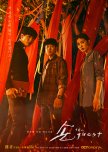
This review may contain spoilers
Best Story about Possession Since "The Exorcist!"
Not since “The Exorcist,” one of the best horror films ever made, has a series captured the sheer horror and terror of possession like “The Guest.” Park Il-Do, a particularly sadistic serial killer, finds his evil spirit lingering and waiting to possess and wreak havoc upon the innocent. However, Park Il Do doesn’t work alone. He has minions who possess and work under him as he attempts to break down and destroy Hwa Pyung Yoon with the hopes of possessing “the perfect vessel.”With unlikely allies in Detective Gil Young Kang, and Father Choi Yoon (Matthew), Hwa Pyung Yoon struggles to protect the innocent and free the possessed while hoping to track down and destroy Park Il Do once and for all.
We find out early on that virtually Hwa Pyung Yoon’s entire family was killed by Park Il Do as well as the families of Detective Kang and Father Matthew. It is these tragedies that bring and bind them together with a common cause: to destroy Park Il Do. Detective Kang’s mother, a policewoman, was killed while saving a young Choi Yoon. And Choi Yoon’s brother was possessed and went on a killing rampage. When they find out about Hwa Pyung’s past and his connection with Park Il Do, they blame him for the deaths of their family members.
Detective Kang is a hard-nosed, hot-tempered detective who carries the death of her mother within her heart and soul, as she was there that fateful night, and filled with guilt about how she treated her mother.
Father Matthew is similar to Detective Kang, as he attempts to find some solace in becoming a Catholic priest. Despite his livelihood, it’s clear that he is also a loner and harboring great pain stemming from that terrible night.
Hwa Pyung comes across as a simple man with a kind, but courageous heart as he fights to free people from possession. A gifted medium, he can often see what is transpiring or is about to transpire, making him a valuable asset. However, it’s his ability to connect with people, which both Kang and Matthew sorely lack.
The series if filled with horrific scenes of possessed people slaughtering the innocent, and often with great delight, as well as scenes of self-dismemberment as the possessed also routinely stab themselves in the right eye, which is a signature of Park Il Do’s influence and presence. I found the episodes involving the little girl particularly disturbing, as it is always challenging to see a child’s innocence and purity being used in such a twisted and vile way.
The series does not require that you believe in Christianity or spirits or possessions. The writers clearly bank on the fact that the audience will find the story compelling, and perhaps frightening enough so that the religious aspects aren’t a problem.
This is a gripping thriller that has the viewer guessing all the way up to the last episode, which person is being possessed by Park Il Do, and of course, how our three heroes will endeavor to stop him. And yet, at the same time, we also find that love always triumphs over evil as Hwa Pyung, not only fights to save the life of his grandfather, but also his two dearest friends in Detective Kang and Father Matthew, while renewing their own faith that love and friendship are not weaknesses but strengths.
I was also happy that the series stuck to the heart of the story without any needless romantic incursions or distractions that would hinder the plot.
The series was done five years ago, and the way things ended, one can’t help but wonder if a second season was possible. Even if it doesn’t happen, this is a fantastic, edge-of-your-seat thriller that will not disappoint!
Was this review helpful to you?
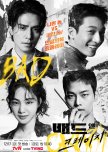
This review may contain spoilers
Bad And Crazy Is a True Thrill!
This may be one of the most unique psychological thrillers I’ve ever seen. I’ll admit that I was a bit confused during the first two episodes as I tried to figure out what the heck was going on with Detective Ryu Soo Yeol who is a part of the Anti-Crime Unit, which basically equivalent to our Internal Affairs. He’s trying to piece together evidence of a missing woman, but a mysterious man in a motorcycle jacket and helmet keeps showing up out of the blue and beating the daylights out of him. While it made for intriguing scenes and shifts within the story, it also left me puzzled.It wasn’t until the end of the second episode that I realized that “K”—the man in the motorcycle gear—is actually Ryu Soo Yeol’s alter-ego. A part of himself that finds himself using when confronted with dangerous situations. The interactions between K and Ryu Soo Yeol aren’t just interesting but also contain some of the funniest interactions of the series.
Of course, as with so many other Korean dramas, there is always more to things than meets the eye, as Korean stories are often like onions. You have to peel back another layer to find out what else is going on. At first, we start with—what appears to be—a simple missing persons case that turns into a ring of drug dealers, which then turns into the mastermind who is secretly plotting Ryu Soo Yeol’s downfall. A deep, dark secret from his past as he struggles to put the pieces together as well as dealing with the fact that he’s got a split personality. In the hands of a lesser writer and director, this series could have easily become ridiculous and laughable.
As the series begins, it’s obvious that Ryu Soo Yeol is a very self-absorbed guy. He is just as corrupt as the police officers that he investigates. He’s not above taking bribes and even turning his back on justice and doing the right thing for an envelope of money. He also warms himself up to his superiors, and by all intensive purposes, he’s living the good life without much care. In many ways, the transformation of Ryu Soo Yeol from nonchalant playboy to someone who finally begins caring about doing the right thing, coincides with the appearance of “K.”
However, it soon begins to be painfully obvious that Ryu Soo Yeol is a bright but careless detective, often going into dangerous situations alone rather than with a partner. There’s a reason why police officers and detectives have partners. First and foremost is so that the partner can corroborate their story and version of what happens. There are several cases where Ryu Soo Yeol might have avoided a situation if he’d used a partner.
Lee Hee Kyum is his love interest and fellow officer. Their relationship begins tenuously because it’s obvious that Ryu Soo Yeol had a short fling with her. However, it’s quite obvious that she still has feelings for him. She’s a capable officer, although she does fail to follow one of the most basic rules of handling firearms: never draw your weapon unless you’re prepared to use it. Such carelessness puts her in a dangerous situation and could have gotten her killed.
The relationship between Ryu Soo Yeol and “K” as well as with Ryu Soo Yeol’s enemy Jung Hyun Soo is what drives this series. It has quite a thrilling and captivating story when we finally realize who is behind the sinister plot to destroy Ryu Soo Yeol.
I’ve seen Lee Dong Wook already in “Touch My Heart” in which he was fabulous. I was more than a little blown away by his portrayal of a very different kind of character in Ryu Soo Yeol. Performances in general were fantastic in this series.
For a series filled with action, suspense, and humor, this one isn’t one that should be overlooked!
Was this review helpful to you?
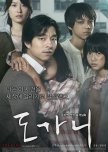
This review may contain spoilers
If a Country Won't Save The Children, Then Who Will?
What is the price of a child? As depicted in this film, it’s either a job promotion or money. I would never have believed that anyone—a parent, grandparent, teacher, prosecutor, or judge--could put a price on a child's well-being. And perhaps that is the most disturbing aspect of this story.Anyone who abuses a child is not fit to even call themselves “human.” These are the vilest and most depraved cowards of any human society.
It has always been extremely difficult to watch any film regarding child abuse. I’m a TEFL teacher, and to even fathom anyone hurting or abusing any of my students literally makes my stomach ache and my anger rise.
I’ve since watched three films that are difficult to watch, and this one was no different. In fact, I had to watch this movie over two-nights because I had to stop it halfway through because I was becoming so outraged. “Sophie’s Choice” is an extraordinary film, and it’s also one that I can never watch again. I can still hear the little girl’s screams as she’s being taken away. “Hope” is another one about a Korean girl who was raped in the most horrifying way imaginable. It’s also another film I can never watch again. “Silenced” is now the third. And as good as it was, I already know that I can never watch this movie again.
Based on a true story, “Silenced” is about the teaching staff at a prestigious school in the town of Mujin. A school for the deaf. A new teacher shows up, and he’s excited about embarking upon his new career until he uncovers a terrible truth: the children are being sexually and physically abused. An especially disturbing scene shows a staff member mercilessly beating a young boy, and yet the new teacher—Kang In Ho—simply stands there and does nothing.
The headmaster and his twin brother are well-known throughout the town for their philanthropy. And in a world where money talks, they are more than capable of buying the silence and lies of the staff, prosecutor, defending attorney, judge, and anyone else who dares to stand in their way.
Despite the evidence and unequivocal records of abuse, family members settle on behalf of their children for money. Such people can never be called “parents” or anything of the sort. They simply see their children as a means to acquire money and nothing more. And as a result, the judge gives out sentences that are so laughable, that if it weren’t so tragic, one just might utter a chuckle in response.
The film is as dark as the fog-bound town of Mujin itself, with few likable characters. Kang In Ho’s own cowardly mother tells him to just let it go because there is no point in doing what’s right. It’s easy to say that until you meet the children face-to-face and gain some empathy and perspective about what THEY have had to endure.
This movie brought a real problem to light in Korea. It forced people to ask what the price of a child is, and what happens when corruption and greed are more powerful than justice itself.
Children are not property! They are not there for you to use at your whim! They are not there for you to live vicariously through, nor are they there to be responsible for your own problems. Anyone who uses children in any such manner are child abusers. You do not own your children. And Korea—as well as much of the world—needs to understand just how far and extensive their child abuse runs. This movie brought to light an extreme case, and still, Korea has failed to listen. Why? Because of the indifference of its people. They simply do not care enough.
I was a bit disappointed by Gong Yoo’s performance. I’m not sure how anyone can simply stand there without any expression of outrage or even concern. Yes, he finally bashes the teacher over the head with a plant, but for the most part, Gong Yoo looks lost with almost placid and indifferent expressions. His own mother berates him for standing firm, and all he can say to her is, “I’m sorry.” Amazing that there is no effort to explain the situation and why it’s of the utmost importance.
This isn’t an easy movie to watch, but it’s a necessary one as it puts a spotlight on a horrendous and truly terrifying problem. People often wonder if there are monsters in this world. Just look at the members of the school staff, their families, the prosecutor, and defending attorney, and the judge to realize the truth—yes, there are, indeed, monsters in this world. And they all need to be fought and defeated. If not, then who will save the children?
Was this review helpful to you?
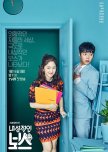
This review may contain spoilers
Eun Hwan Ki Storyline Works...Romantic Dynamic Does Not
There is actually a difference between an introverted person and a shy person. An introvert is someone who tends to be more within himself/herself. They usually don’t have any problem being alone. While they can struggle to interact with others, it’s not always the case. They have no desire to be the center of attention or be placed in the spotlight. More and more psychologists are finding that being able to be alone is a strength rather than a weakness. It’s not the same as hiding oneself away out of fear. That would be shyness.My Shy Boss is a decent romantic drama at best, with two characters who stand on a mountain of integrity among a sea of supporting characters who struggle to find any at all. Eun Hwan Ki is a master of ideas, and while he doesn’t realize it, he’s also a master of dealing with people. However, he’s also a bit of a recluse who prefers the quiet solitude of his penthouse apartment rather than handle the day-to-day interactions with employees and clients. He’s immensely creative and has a knack for seeing things that others fail to see. He’s also a great listener, but his biggest problem is that he always puts others ahead of himself. He’s the guy who’s going to take the hits, put himself in front of the bus, and do whatever it takes to protect those who are unable to protect themselves. In many ways, he’s the true hero of the story, and he has the humility to do so without asking for anything in return.
Seo Yun Jung is other. This is a woman that others should try to emulate. She’s no wallflower, and she has absolutely no problem pursuing what she wants. She’s also the only other character who is perfectly comfortable with herself. The scene that made me stand up and cheer for her was when she turns the tables on Eun Hwan Ki’s father. This isn’t a woman who can be used, bought, or sold. And she had absolutely no problem taking issue with the despicable actions of Eun Hwan Ki’s father and telling him straight to his face. While I understand that Chae Ro Woon is the love interest of Eun Hwan Ki, I was really hoping (even though I knew it wasn’t going to happen) that he would have ended up with Seo Yun Jung. She’s a pillar of strength, who isn’t just someone who can be a romantic partner, but one who will easily stand with Eun Hwan Ki no matter what. Chae Ro Woon cannot say that. I lost count how many times she oscillates back and forth, back and forth. And Seo Yun Jung is far more mature as well.
You’ll need a clipboard of names to keep track of all of the “who likes who” at any given moment. I’ve never seen a drama with so many dynamics; so many that you just might get a headache.
Most of the characters are people who are looking for love and attention in all the wrong places. They truly believe that they cannot be happy unless they are with someone. What they fail to realize is that it is literally impossible to find happiness in someone else if you fail to find it within yourself first. Why? Because you cannot give what you do not have.
If you love yourself, you will never contemplate suicide as an answer to being denied/rejected.
If you love yourself, you will never harm yourself or use it as a means of getting attention.
If you love yourself, you will never feel empty by being alone. In truth, you will find it empowering.
If you love yourself, you will never allow anyone to use you for their own selfish reasons.
Chae Ro Woon—much like Eun Hwan Ki—is an outcast within her own family. She’s the outgoing one, and nobody knows how much her older sister is suffering until it’s too late. The sad thing about suicidal people is that you cannot save someone who does not want to be saved. If someone is bent on killing themselves, they will find a way. Chae Ro Woon is very much like a kid. She’s immature, selfish, and she doesn’t realize the mess she’s made until it’s too late. Rather than trying to find out the truth about her sister, she reacts emotionally, and irrationally, and hellbent on revenge.
It's always hard to hate someone once you get to know them. Chae Ro Woon begins to wonder if she has it right as she gets to know Eun Hwan Ki and realizes that he’s not the monster that she thinks he is.
There are a number of cowardly and despicable characters in this series. Eun Hwan Ki’s father is about as vile and violent of an abuser as you’ll ever likely to find in a “parent.” He’s ashamed of his son for being quiet and shy, and he has no problem being abusive—both physically and mentally—toward him. Such a person has no business calling himself a parent.
There are several problems with this series. First, people who are that suicidal and prone to hurting themselves as Eun Yi Soo (Hwan Ki’s sister) can miraculously heal themselves. Most people need some kind of professional help. Hwan Ki makes a grave mistake by not helping her get the help that she needs. The writers should have taken this far more seriously than they did. I’ve known people who have attempted suicide, and it’s no quick fix. However, Eun Yi Soo at least seems to understand that her problem stems from not loving herself, which is true. That’s a good first step. Given that Korea has the 3rd highest suicide rate in the world, I would have hoped for a more thoughtful and realistic approach to this part of the story.
The romantic dynamic between Eun Hwan Ki and Chae Ro Woon just doesn’t entirely work. First of all, the two actors have good chemistry together but NOT good romantic chemistry. Again, I thought the Eun Hwan Ki/Seo Yun Jung was better from a romantic chemistry standpoint, even though they didn’t really share any romantic scenes. The romance between Eun Hwan Ki and Chae Ro Woon was like watching a grown-up and a kid. Park Hye Soo just doesn’t have the chops to act out romantic scenes realistically. She tries to flirt, but comes across more like a child wanting attention, which was annoying more than just once! This is largely due to Park Hye Soo being miscast. I would have had Park Hye Soo play Eun Yi Soo (the sister) and Gong Seung Yeon play Seo Yun Jung with Jang Hee Jin taking up the role of Chae Ro Woon Jang Hee Jin was fantastic in “Flower of Evil”. Jang Hee Jin has far more range and acting prowess than Park Hye Soo. And as I’ve said, the constant back and forth between Eun Hwan Ki and Chae Ro Woon became tedious and unrealistic very quickly. Soon, they’re kissing, and next they won’t even touch each other. That was just silly.
By episode 15, I was just waiting for the series to end. It loses much of its steam in the last two episodes, and the story feels like it’s treading water, trying to limp toward the finish line of the last episode. Of course, we get another childish scene with Park Hye Soo because she doesn’t get a Christmas card from Eun Hwan Ki. Chae Ro Woon is what we call a “high-maintenance” girl.
I found myself far more intrigued with Eun Hwan Ki and how he was able to empower his small team of “misfits” to start believing in themselves. While they each helped him to develop more courage to stand in the spotlight, we also see what he’s done for the members of his team. Eun Hwan Ki is also a man—much like Atlas—who’s caring the weight of everyone on his own shoulders. He’s noble and courageous. We only wish he’d use just an ounce of that strength and belief on himself. If they had left the romantic aspect out of the story, this would have been a far more compelling series because the strength of the story is Eun Hwan Ki, and Yeon Woo Jin did an absolutely fantastic job with the role. My only issue was that his “shyness” was handled with a lot of inconsistencies, but that is a small issue.
Overall, the series is okay at best. If there is a central theme to this series, it’s for people to start putting themselves first. Learn to love yourself before you decide to share that with someone else. “It’s Okay to Not Be Okay” is still the best drama series yet made on people who are psychologically and emotionally scarred. And just because you have feelings for someone, doesn’t mean that they should automatically reciprocate. And, yes, love is about courage; about taking risks and putting yourself out there. The quiet ones who never tell others how they feel will always live a life of regret.
And if you know someone who’s attempted or might attempt suicide, get them professional help! Sometimes, you have to acknowledge that you love someone so much that you cannot help them, but you will find someone who can!
Was this review helpful to you?
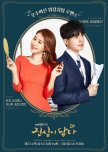
This review may contain spoilers
Let Yoo In-Na and Lee Dong Wook Touch Your Heart!!!
What is the price of fame and integrity? Must one be sacrificed to insure the other? In this day and age, many celebrities are in the spotlight more than ever before. With social media being a constant problem, it’s more challenging than ever for celebrities to live their own lives. That’s not to say that it can’t be done. Some of the world’s biggest stars are able to separate their personal lives from stardom. Such people like Tom Cruise, Denzel Washington, and others are able to maintain their private lives while doing their job. For the most part, anyway.If there as a “most common theme” for romantic comedies and dramas, it’s the “opposites attract” dynamic. It’s been done so often that it’s often a surprise when one that works actually manifests. “Hometown Cha Cha Cha” is still one of my all-time favorites because of its genuineness and not falling into the cliches that are so typical and rampant in such series. “Our Beloved Summer” is still my favorite series involving “young” love.
I saw the high ratings of this series, but I kept putting it off because I wasn’t sold on the fact that it wouldn’t be like every other one that’s come down the pike. Boy meets girl, they don’t get along, they magically start liking each other, a conflict arises (usually a third-party boy/girl who’s interested in one of our stars), and they resolve and get back together in the end.
What makes Touch Your Heart so endearing is the performance of Yoo In-Na and also Lee Dong Wook. Things start off in a typical fashion, but the journey is deeper than expected. And what surprised me was that the writer didn’t throw anything into the series to churn things up. They remained true to the characters. Another reviewer posted that this was a binge-worthy series. Frankly, I found myself starting out watching one episode, then two per day, and soon I was up to three. The reviewer wasn’t wrong in that.
A popular actress, Oh Yoon Seo finds her career nearly destroyed by a scandal involving drugs and a stalker. She’s trying hard to make a comeback, but even her agent can’t overlook that she’s also infamously known for her “bad acting.” However, she’s finally given a small window of opportunity to star in a legal drama series. It’s agreed that if she wants the part, she must gain some knowledge of how things work in the field of law. Thus, she’s sent to work for three months at a small, but fairly prestigious law firm.
Oh Yoon Seo is almost childlike in her naivety and immaturity. Never having had to work in a place of business before, she’s a bit like a fish out of water, lacking professionalism and experience. She shows up on the first day in a party dress that’s too low up top and too short at the bottom. She has a tendency to pout and whine as well as rely heavily on others to do things and make decisions for her. She’s someone who looks to be in her late twenties or early thirties but acts very much like someone in their late teens. Now, such characters have been done to death, and frankly, nearly all of them end up coming across as annoying and often unlikable. A seasoned actor knows how to take a character—who can come across as unlikable—and make them likeable despite the flaws. Yoo In-Na is a true master at her craft. She knows Oh Yoon Seo inside and out. She brings charm, elegance, and an almost childlike innocence that makes were so endearing to the viewer. Despite caring too much about being popular, and what everyone thinks about her, by the end of the series, she finally learns how to stand on her own two feet and appreciate what is truly important in life. It’s not fame or popularity. It’s having someone with you who vows to be with you no matter what. There isn’t enough fame in the world to buy a companion like that.
Attorney Kwon Jung Rok is the best lawyer in the firm. He’s also the coldest and stuffiest. He’s so immersed in his job that he has little time for anyone or anything else. And he’s given the unenviable task of taking on Oh Yoon Seo as his secretary. It’s hilarious how put off she becomes when he doesn’t even know who she is. He could care less that she’s a popular actress. And, of course, the two of them do not hit it off well. He chews her out about her attire and lack of professionalism in the workplace. He has a job to do, and he makes her understand that she’s not there to goof around and tinker on the internet. And he has absolutely no qualms about telling her exactly how he feels about her and their situation, which he never asked for, and initially sees as a burden.
One thing I tend to really like about Korean series is how they make their characters change and grow. As Kwon Jung Rok and Oh Yoon Seo grow closer together, we see Kwon Jung Rok begin to lighten up and enjoy himself. He’s like a stiff block of ice that slowly begins to melt. He’s very formal in his speech and how he carries himself. We even begin to see him smile—something he never really does from the outset. Conversely, we also see Oh Yoon Seo begin to appreciate the work ethic and what it means to do something well. Perhaps she was never considered a good actress because she never put in the time and effort. She relied solely on her popularity. But she also begins to realize the strength in being able to stand on one’s own feet. And Kwon Jung Rok is a master at that. He knows he’s not popular at the firm or around most people. He knows the things that are said about him, but he really doesn’t allow those things to affect him. In short, he lives his own life without excuses or apologies. Oh Yoon Seo cannot say that about herself.
Another fascinating dynamic that is handled extremely well is this: exactly how does one date a well-known celebrity and handle all of the things that go with that? It doesn’t take long for Kwon Jung Rok to find himself thrown into the deep end of that world. A world of gossip, criticism, and scandal are popular everyday things that a celebrity must deal with. Thanks to Oh Yoon Seo’s annoying and meddlesome manager, he convinces Kwon Jung Rok to end the relationship. I’ve said it in other interviews: I can’t stand meddlers. Such people are like wolves in sheep’s clothing. They claim that they have the other person’s interests at heart, when in fact, the only person they are thinking about is themselves. Her manager never considers discussing it with Oh Yoon Seo, and the reasons he gives to Kwon Jung Rok are entirely selfish and about him.
Break-up scenes have been done so many times in so many series, that you can easily see them coming. In most cases, the breakups are not handled well. This series was no exception, especially when you summarily discount and dismiss everything that has gone on before. Kwon Jung Rok breaks up with Oh Yoon Seo, and there’s barely even an attempt at discussing things or trying to figure out why. Yes, Kwon Jung Rok gave reasons, but it’s exactly because it was so out-of-the-blue, that Oh Yoon Seo would have realized that something was off. I wish writers would put more thought and intelligence into these moments.
The performances across the board are stellar. This is the third drama I’ve seen with Oh Jung Se, and he’s simply incredible in everything I’ve seen him in. I’ve seen him as an autistic character in “It’s Okay to Not Be Okay,” a hardened criminal in “The Good Detective,” and now as the often-comedic CEO of the law firm.
I truly loved the integrity of Kwon Jung Rok that he never really wavered in his devotion and trust to Oh Yoon Seo. He never saw her as a celebrity but simply as a woman he fell in love with. Isn’t that what everyone—including celebrities—want? Perhaps that is why Oh Yoon Seo fell for him as well.
Yoo In-Na has a way of completely captivating the viewer with her charm. This is the first series I’ve ever seen with her. I was blown away when I read her profile and read that she’s 40! She has a way of conveying emotions with simple expressions that just make you want to cuddle up to someone like that. However, I also loved seeing begin to grow stronger as Oh Yoon Seo finds the courage to deal with things herself, rather than always relying on other people. And, of course, the end—which was the one thing I was hoping for—when she finally announces her relationship to Kwon Jung Rok at the party. Yoo In-Na also has an absolutely captivating smile! Her whole face lights up!
No one should have to apologize or make consolations for anyone in how they live their lives, celebrities included! I’m constantly appalled by the things that agents, studios, and managers ask celebrities to do, all for the sake of money and promotions. Such people are weasels and have no integrity.
This was a wonderful series that is light, often filled with very humorous situations, but also conveys important messages. Live your own life. Don’t live by anyone else’s rules. To do so is to give your power away. Learn to have fun and enjoy yourself. And perhaps above all, never compromise your integrity and self-respect for fame and popularity. Such things are always fleeting and do not last, while integrity and self-respect are assets to carry with you for the rest of your life.
Was this review helpful to you?
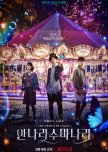
This review may contain spoilers
True Magic Is Believing in Yourself and Creating Your Own Path!
Woe to those who allow others to dictate their lives and their path. There is nothing so tragic in the world as those who allow themselves to be controlled by others. True magic—true courage—is about forging and creating your own path, no matter how many people object or attempt to destroy your hopes and dreams.The Sound of Magic is a beautiful story, full of life, love, wisdom, and a bit of magic! True magic is believing in your Self and creating your own path. And that is the central theme of this series.
Yoon Ah Yi is a smart but struggling high school student whose life has been riddled by nothing but hardship. Her mother is gone, her father is in severe debt and stays away for long periods of time, trying one “get rich” scheme after another, leaving the adult responsibilities of taking care of her younger sister and paying the rent to Yoon Ah Yi. Her life is exhausting and non-stop, leaving little—if any time—for joy and fun. In short, Yoon Ah Yi has had to grow up very quickly, which leaves her to wonder where her childhood has gone. But soon, her imagination is awakened by the magician.
Next, we have Na II Deung, the top student at the local high school. He’s put under such pressure by his teachers and especially his parents—to do whatever it takes to be number one and to succeed academically. For those who are unfamiliar with educational pressures in Korea (as well as other Asian countries), I will say that as a TEFL teacher who worked in Korea, Taiwan, and China, the depiction of the hardships that many students have to deal with is quite realistic and true. I actually had a student tell me that his mother was so disappointed in his recent test scores that she told him, “If you can’t do any better than this, then you should just throw yourself off the balcony!” I couldn’t imagine any mother saying such a thing to her son. Most of these kids are not given any choice in how they live their lives. This is true regarding their school, university, job, and even marriage. Kids are expected to “fall in” and do what they are told to do because parents arrogantly and ignorantly, think they know best. And we see that Na II Deung is suffering immeasurably from the enormous pressures—until he meets the magician.
Ri-Eul is easily the most compelling character of the series, leaving the viewer to ask the same questions that Yoon Ah Yi and Na II Deung ask: is he really a magician? With a twinkle in his eyes, Ri-Eul simply asks, “Do you believe in magic?” As we know, children have no problem believing in any kind of magic. Their purity and innocence cause them to believe without question. As it’s stated in the wonderful movie, “The Santa Clause,” Seeing isn’t believing. Believing is seeing. It’s only when the cynical nature of adulthood sets in that magic becomes something that is silly, childish and severely mocked and frowned upon. And yet, what is life without it? Ri-Eul brings a childlike vision of the world; that just because you grow up doesn’t mean that you have to stop believing. But what makes Ri-Eul so wonderful and compelling, isn’t the tricks and magic that he uses. It’s his use of that magic to help Yoon Ah Yi and Na II Deung begin to believe in themselves. To help them realize that you don’t have to “fall in” and let others tell you how to live your life.
Of course, as with all “strange” and “outside the box” characters, the world tends to shun and persecute such people, and so Ri-Eul becomes the leading suspect in a murder investigation. It’s sad that the world always tends to view such people as “dangerous” when it’s actually the world’s fear and desire to control everyone that is truly dangerous!
There are some great songs in this fantasy series which is also a musical. And the acting performances across the board are stellar! However, it’s Ji Chang Wook’s performance as Ri-Eul that really brings it all together. Without his ability to tap into Ri-Eul’s childlike innocence, the series wouldn’t be the same. The series—like so many Korean dramas—is full of wonder, humor, wisdom, and heartfelt moments that make you introspect and ask the question: am I living the life I want? And if not, it’s never too late to start.
Robert Frost’s famous line in his poem The Road Not Taken—two roads diverged in a wood, and I took the one less traveled by. And that has made all the difference. And that is one of the core messages of this series. Na II Deung may have delivered the best line of the series when he says, “Flowers don’t grow on asphalt. They grow on bumpy, dirty roads.” So, which is the better life?
Give yourself permission to dream, to believe in magic, and most importantly, to believe in yourself. Dare to dream and to create your own path, no matter what anyone says or does. People will put you down and get upset because you’re not doing what everyone else does. This is usually a huge clue that you’re doing right by who you are. Approach the world with childlike wonder and innocence. Stop to look at all of the magic around you, whether it be a tree, a field of flowers, or a butterfly. It’s everywhere.
The world—especially our young people—are in dire need of this kind of message. When I was growing up, The Dead Poets Society was my inspirational film to help me to question what I was doing. We should all endeavor to be more like Ri-Eul—to live the life we want and not allow the world to push us down. After all, all of the magic we ever need or want is within us. Don’t be afraid to use it, and certainly don’t be afraid to believe in it.
Was this review helpful to you?
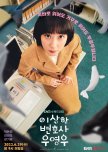
This review may contain spoilers
The Wisdom of Woo Young Woo!
It is sad that the world is not more accepting of those with mental or physical handicaps. Given a chance, we find that such beings are more than capable. Everyone can contribute to the world, no matter how big or small.If you’re like many other people who’ve seen this beloved series, you’ll find yourself immediately enamored by Attorney Woo Young Woo…no matter how it’s flipped, it reads the same! And no matter how much you try to look at Woo in a different way, she’s still her charming, cute, and beautiful self!
We all need a Woo Young Woo in our lives. Such people are often devoid of egotistical traits. There is no animosity or hatred behind their words. And when they love, they love completely. How many people in the world can claim this? We often look at people in the world like Woo Young Woo as having problems. And yet, I daresay, perhaps WE are the ones who should be more like her! Such is the purity of innocence. To have the essence and wonderment of a child. And why are children so wonderful? Because they’re like sponges who are free of shame and guilt—such traits are learned behaviors that are sadly instilled in them by parents, society, culture, religion, etc. Woo Young Woo is like being an eternal child, and that is not a bad thing! It's something we should all aspire to be.
Like very few autistic people, Woo Young Woo would be classified as a savant. Someone with incredible mental abilities to remember pretty much anything and everything. Such a skill makes Woo Young Woo an amazing asset as an attorney, despite her lack of ability to read people and understand various emotions. Sudden emotional outbursts tend to frighten her, and she’s not immediately comfortable in foreign environments. She also has an aversion to being physically touched. But don’t let these things fool you since Woo Young Woo has more charm than most people can begin to dream about.
Eun Bin Park gives a tremendous performance as Woo Young Woo. The only other characters I’ve seen that match hers were autistic performances in “It’s Okay to Not Be Okay,” and “Move To Heaven” (two more incredible Korean dramas if you’re looking for something!). Eun Bin Park will have you laughing, smiling, and occasionally tearing up with her delightful performance. She may well have given us one of the cutest characters I’ve ever seen. And yet, she also shows us the absolute brilliance of Woo Young Woo as an attorney. Yes, we’re talking about someone along the lines of a Perry Mason. But what makes her truly remarkable is her integrity; her unwillingness to compromise her values in doing what is right. How many attorneys can claim that?! Not very many, I’d wager.
And, of course, because of Woo Young Woo’s innocence, she also brings with it a childlike naivety which makes her vulnerable to those who would try to take advantage or mistreat her. It can be a bit painful sometimes to watch those scenes, as all you want to do is be like Jun-Ho and do your utmost to protect her.
Woo Young Woo describes herself once as a narwhal living among beluga whales. She knows she’s a bit peculiar to most people, but she not only learns to adapt but to accept herself as she is. I would actually go even further and say she’s like a gold nugget among lumps of coal. She’s far more precious and special than even she can comprehend or realize. And part of the charm of the show is watching those who doubted and even abused her, begin to soften and realize how precious she really is.
Another beautiful aspect of the show is the simple, and yet beautiful romance between Woo Young Woo and Jun-Ho. And the reason why it is so incredibly unique is because Jun-Ho fully accepts Woo Young Woo as she is. He never asks her to change or be anything other than who she is. In short, this is one of the rare depictions of unconditional love that many people search for, and yet very seldom find.
Extraordinary Attorney Woo is a true delight. It’s also light drama in case you’re searching for something that isn’t too heavy. And the court cases are always very intriguing to watch as we wait and see what magic Woo Young Woo is about to pull. I’ve already heard that a second Season will be made. And well, I never get tired of Woo Young Woo’s love and talk of whales. I definitely want another season of this charming and delightful show!
Was this review helpful to you?
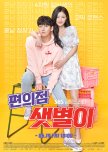
This review may contain spoilers
Cowardly and Weak Characters and Writing Nearly Torpedo This Series!
This series was fairly strong through the first 12 episodes. It should have ended there, rather than filling the last four episodes with needless drama and uninteresting stories."Our Beloved Summer" is easily the best K-drama about young love that I've yet seen. It had intelligent, likable characters with a nice, smooth, and non-cliched story. This series falls well short of that one. The only thing that saves this series from the depths of despair is that it has strong performances by most of the cast.
Unfortunately, we have a menagerie of weak, cowardly characters, that for a while, are at least likable. That is, until they continue to demonstrate cowardice and weakness until the end.
Choi Dae Hyun is an honest and good-hearted young man nearing 30 who owns a convenience store. He treats his customers with respect and kindness. However, when it comes to his love life, Dae Hyun is about as dense as they come. In our culture, he's what we call a "whipped" man. Someone who has no say or power with his girlfriend. She calls the shots. She abuses him to no end. She toys with him like a puppy, and yet, he hasn't the brains or the guts to do anything about it. It's hard to feel sorry for people like this because they are part of the problem. The abused is just as much responsible as the person doing it.
We also have Saet Byul, a master of martial arts, and a young woman who falls hopelessly in love with Dae Hyun. She also has the task of raising her little brat of a sister. However, Saet Byul isn't very responsible. She provides underaged high school kids--including her sister--hard liquor to drink. She also never has the guts to seize opportunities when they present themselves. She also commits the most brazen act of cowardice by running away when she deems herself unworthy of Dae Hyun. Frankly, I never would have wanted her to come back. The writers proved how inept they were with the characters by creating plot points that go against the characters they created. There is no way Saet Byul would turn down Dae Hyun's initial offer of love. The writers simply felt the need to fill another few episodes with pointless drama. Yet another reason why the show backfires.
We also have two typical Korean mothers who dominate, interfere, and meddle in their children's lives. Of course, the key reason has nothing to do with love at all, but about money. It's sad how many people in this world equate success with money. Such parents have no business being parents. They claim to "know better" when they clearly do not. And meddlers may claim that they are doing it for someone else, but that is a lie. They are only doing it for themselves. And, even though I understand that this is an Asian culture, it's truly sad when a 30-year-old man can't stand up to his mother and simply tell her the truth.
We also have several uninteresting characters in Dal-Shik--who is funny in some respects--and Eun Byul, Saet Byul's bratty sister. This actress was the only one whose performance was cringe-worthy. Always uttering her lines in that whiny tone. And her story was left open-ended, as was Dae Hyun's sister.
By the 13th episode, I found myself no longer invested or caring about what happened between Saet Byul and Dae Hyun. Both pretended to be honorable, but they were cowards instead. I even fast-forwarded through most of the final episode because it was that bad. Oh, and you had one of the worst cop-out kissing scenes I've ever seen in the last episode.
However, as I said before, the performances were mostly very good. Ji Chang Wook has a real gift for comedy and the delivery of his lines. I thought that he was simply outstanding. It's just too bad he wasn't given a better script to work with.
Kim Yoo Jung was also very good as Saet-Byul. She has a dazzling smile that reminds me a lot of Lynda Carter from the 1970s. Both have unparalleled smiles. Only Mina Shin can equal her, except that Mina Shin has done a far superior job in picking good roles. Shin is still easily the much better actress.
I've always loved Kim Sun Young. I've already seen her in a few roles, including "Crash Landing On You" and she's just a brilliant character actress. It's too bad that her role was very much wasted here as a woman who is clearly ashamed of her husband and family. It's always sad to see a parent have shame for those closest to them. It simply speaks to their own problems and issues.
I really wanted to like this series, and as I said, I did for a while until it was bogged down in useless, petty melodrama and cliched plot lines that no longer fit the characters. This series is definitely a "must miss" in my book. I want characters that end up with redeemable traits as well as being likable, even if they don't necessarily start out that way. This show gives us characters that I'd never care to get to know or cheer for. And that is what is truly sad.
Now I need to quickly go and find a quality K-Drama to wash the bad taste of this one out of my mouth.
Was this review helpful to you?

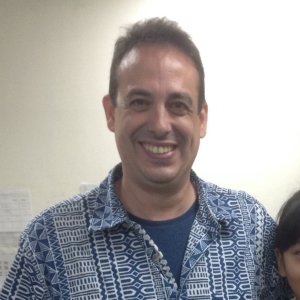
 1
1













